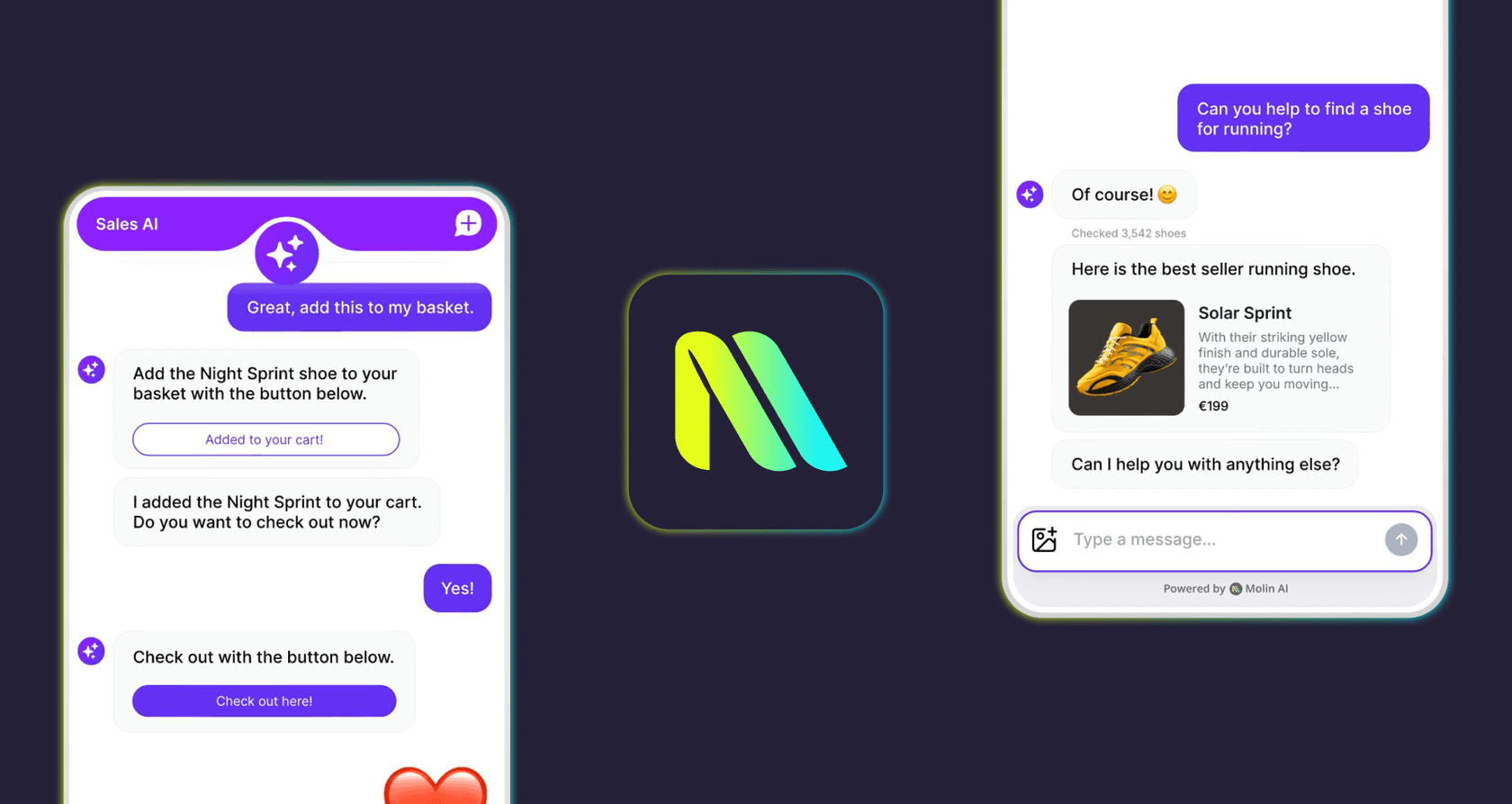
Running an e-commerce store feels like a constant juggling act, right? You're trying to boost sales while also keeping customers happy with great support. It's a lot. Shoppers want answers now, but your team can't be online 24/7. That’s why so many people are looking at AI chatbots, the promise of a perfect employee who never needs a coffee break.
Molin AI is one of the names that keeps popping up. It pitches itself as an AI shopping assistant that can increase your conversions and handle support chats. Sounds great on paper, but does it hold up in the real world? In this Molin AI review, we're going to pull back the curtain and look beyond the sales pitch. We’ll check out its features, pricing, and what actual users are saying so you can decide if it's right for your store, or if you need something with a bit more horsepower.
What is Molin AI?
So, what exactly is Molin AI? At its core, it's a chatbot that uses ChatGPT technology and is designed specifically for e-commerce sites. Imagine a digital salesperson and a basic support agent combined into one, living in that little chat bubble on your website. Its main gig is to chat with visitors, answer their questions, and hopefully nudge them towards making a purchase.
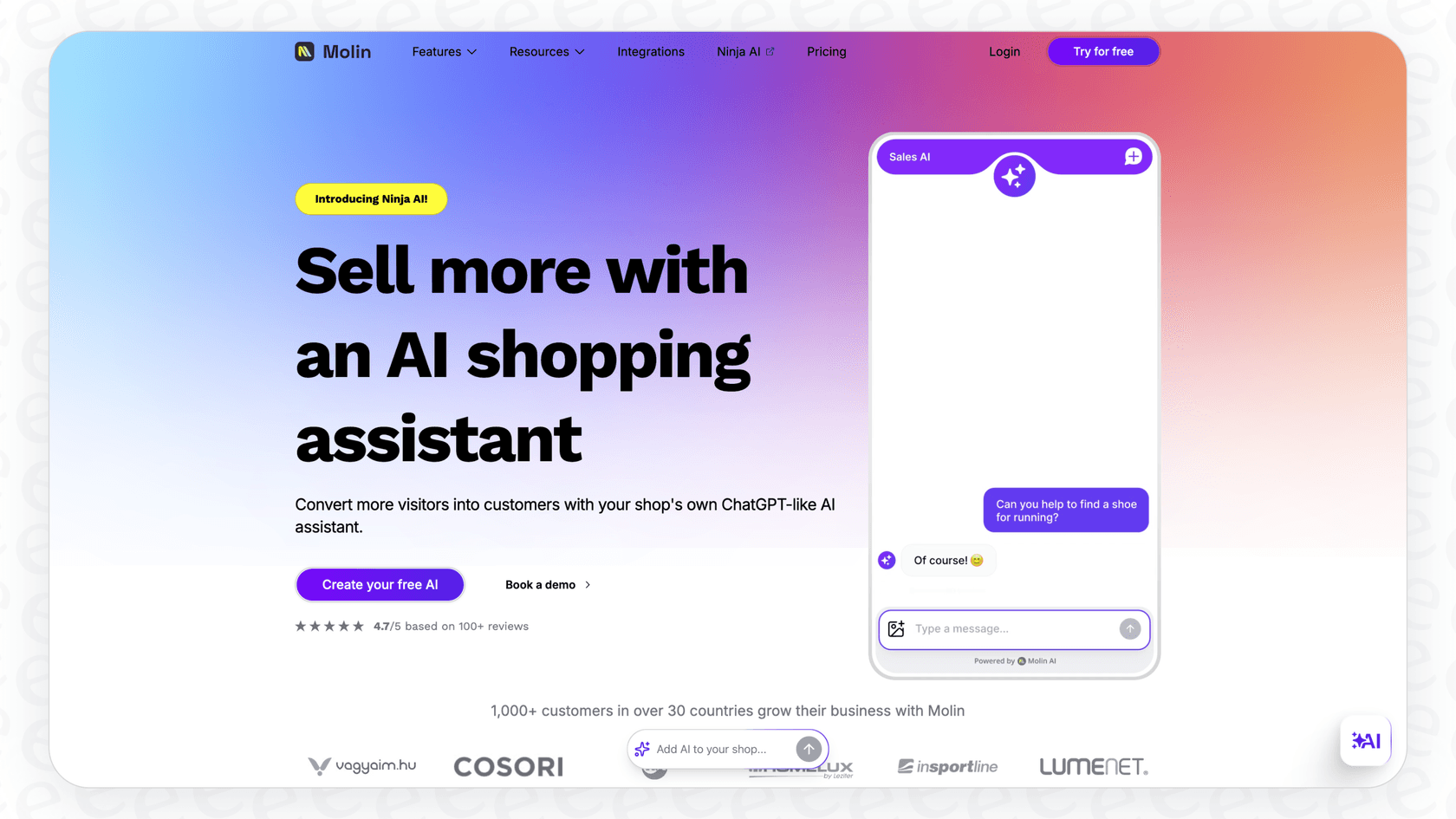
The whole idea is to offer 24/7 conversational support in over 90 languages, which sounds impressive. It plugs directly into big e-commerce platforms like Shopify, so it can access your product catalog to answer questions and even make recommendations. Molin's sales pitch is all about turning more of your website visitors into paying customers while cutting down on the simple support tickets that clog up your team's inbox. It’s about automating those repetitive questions to give your team some breathing room and, in theory, boost your revenue.
A deep dive into Molin AI's core features
A tool is only as good as its features, so let's get into the specifics. What does Molin AI claim it can do, and more importantly, what are people who've used it actually saying?
The promise: AI-powered sales and support
Molin AI's whole vibe is centered around what the customer sees on your site. Here’s a rundown of its main promises:
-
AI Product Recommendations: The bot is supposed to figure out what a customer is looking for and then suggest the right products from your catalog. The goal is to act like a helpful store clerk, guiding shoppers to what they need and hopefully bumping up your conversion rates.
-
Automated Order Updates: We all know the most common question is, "Where's my order?" Molin AI is built to connect to your store's backend, look up order details, and give customers tracking info right in the chat. This is all about self-service, so customers get instant answers without needing to talk to a human.
-
Lead Collection: If a visitor isn't quite ready to buy, the chatbot can ask for their email address or phone number. It then sends these leads to your team for future marketing efforts, helping you build your email list.
-
Live Chat Handover: For those times when the bot gets confused or a customer just really needs to talk to a person, there’s a feature to pass the conversation over to one of your human agents. This ensures tricky or sensitive problems still get a personal touch.
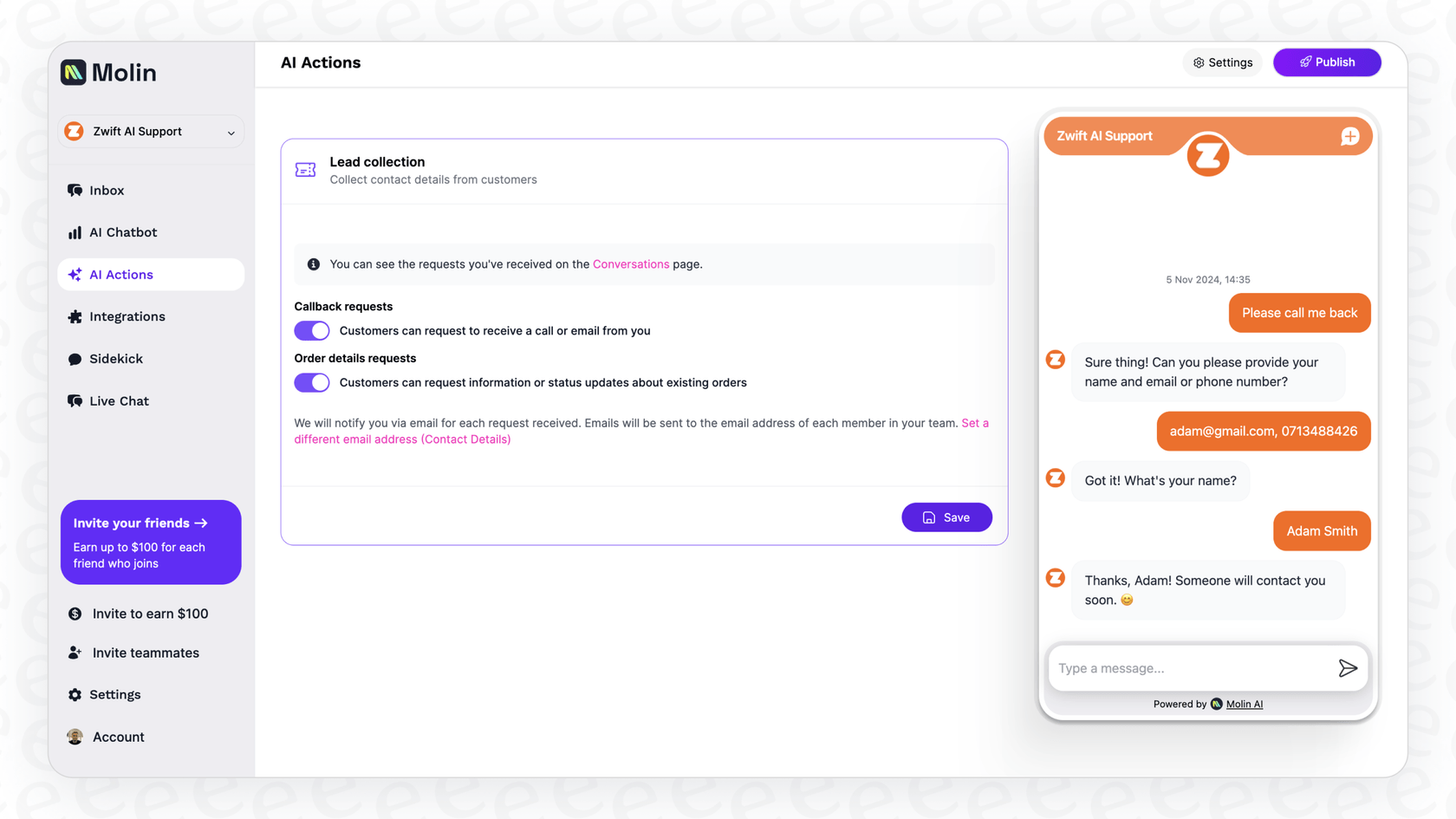
The reality: Where the features fall short
That all sounds pretty good, but when you start digging into user reviews, a different story emerges. It seems like reliability is a major sticking point.
The biggest worry is that its core functions can be wildly unpredictable. One user on Trustpilot shared a pretty shocking story where their bot recommended a completely inappropriate and bizarre product, "herpes cream" in a store that sold t-shirts and hoodies. You just can't make this stuff up. When your AI sales assistant is making blunders like that, it’s not just failing to help; it’s actively hurting your brand's image.
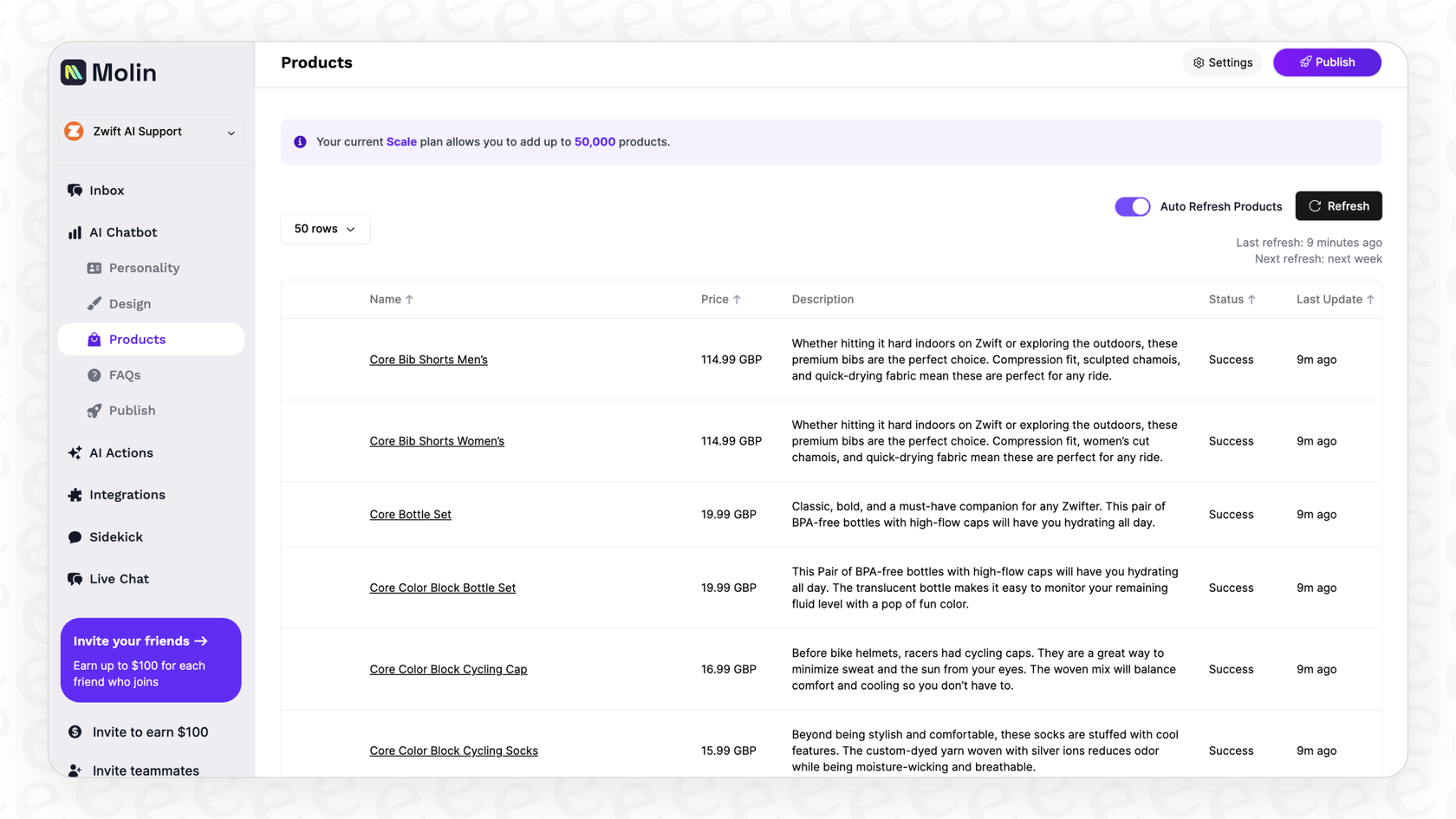
This wasn't just a one-off glitch. The same review mentioned that a lot of the features they were sold on either "don’t exist, don’t work, or are simply 'not available for your store' once you’ve actually paid." That's a classic case of over-promising and under-delivering, mixed with what seems to be some seriously buggy software.
On top of that, Molin AI's automation feels a bit superficial. It's all about that front-facing chat widget, but it doesn't do much to help your team behind the scenes. Real support automation isn't just about blocking common questions; it’s about making your internal team faster and more effective. Molin doesn't offer tools for sorting tickets, helping agents write replies, or managing your internal knowledge base, all of which are essential for a growing support team.
The alternative: A unified platform for total support automation
This is a big reason why many teams opt for a more integrated tool like eesel AI. Instead of being just another chatbot, eesel is a full support automation platform that plugs right into the helpdesks you already use, like Zendesk or Freshdesk.
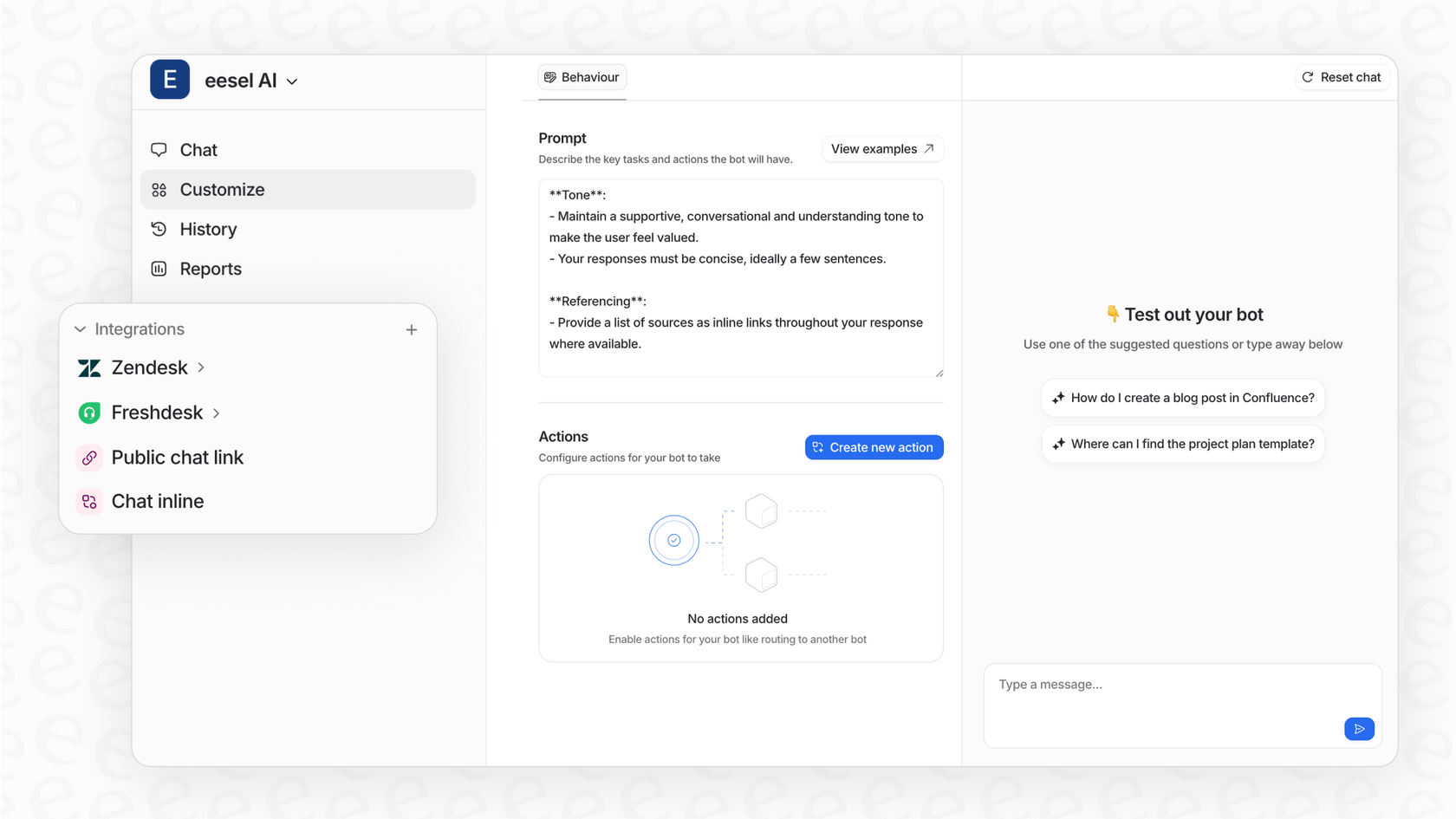
eesel AI picks up where Molin's features leave off by providing a much deeper set of tools:
-
AI Agent & AI Triage: These features live inside your helpdesk. They can automatically route tickets to the right person, add the correct tags, and even resolve common issues completely on their own, often before an AI Agent even sees the ticket.
-
AI Copilot: This is like a superpower for your human agents. It instantly drafts accurate replies by learning from all your past tickets and knowledge sources. This means faster, more consistent answers for your customers.
-
AI Internal Chat: You can set up a powerful Q&A bot for your own team inside Slack or MS Teams. It brings together all your scattered information from places like Confluence and Google Docs, so your team can get quick answers without having to hunt for them.
The key difference is that instead of just adding another channel for your team to worry about, eesel AI makes the tools and processes you already have smarter and more efficient.
Setup and integrations: How does it fit in your stack?
Let's be real, a new tool is only useful if it doesn't cause a massive headache to set up and use with your other software. If it’s a pain to get started or it doesn’t work well with your other tools, it can just create more work.
Onboarding and integrations
To be fair, users say Molin AI's initial setup is pretty straightforward, especially if you're on Shopify. It’s largely designed to be a plug-and-play solution for its main e-commerce integrations, which include Shopify, WooCommerce, Shoprenter, and Unas.
This tight focus on e-commerce platforms really shows who Molin is for: online store owners who want to get a chatbot on their site without needing a developer.
The gap: Lack of deep workflow integration and control
But here's the catch: a simple setup isn't the same as a deep, meaningful integration. Molin AI might connect to your store, but it doesn't really talk to the tools your support team lives in every day. It ends up feeling like a separate, disconnected channel. This can actually make things more complicated, as your team has to manage tickets in their helpdesk and also keep an eye on the chats being handed over from the bot.
This is where eesel AI takes a completely different route. It’s built to be radically self-serve and slots into your existing workflows in minutes, not months. The one-click helpdesk integrations mean you don't need any complex API work or developer hours to get started.
Even better, eesel AI gives you a way to deploy with confidence. It has a powerful simulation mode that lets you test the AI on thousands of your past support tickets in a safe, private environment. You can see exactly how it would have answered, get solid predictions on how many tickets it will resolve, and tweak its behavior before it ever talks to a single customer. That ability to test and trust the AI before you go live is huge, and it’s something you just don’t get with Molin AI.

Pricing: What's the real cost?
Alright, let's talk money. When you're looking at any software, you have to look beyond the price tag. What do you actually get, and are there any hidden costs or headaches to worry about?
Molin AI's pricing plans
Molin AI has a few different plans that, on the surface, seem quite affordable. Here's a quick look at what they offer on their pricing page:
| Plan | Price (Billed Annually) | Conversations | Products | Key Features |
|---|---|---|---|---|
| Free | $0/month | 25 | Up to 500 | Human handover, 5 preset answers |
| Startup | $19/month | 125 | Up to 2,000 | Lead collection, Social integrations |
| Growth | $55/month | 500 | Up to 10,000 | Order updates, Remove branding, Limited analytics |
| Scale | $119/month | 1,250 | Up to 50,000 | Order modification, Full analytics, Custom AI Actions |
| Enterprise | Custom | Custom | Unlimited | Custom integrations, Dedicated success manager |
Hidden costs and a transparent alternative
The monthly fees might look tempting, but user reviews tell a cautionary tale about what you might actually end up paying. Several customers on Shopify and Trustpilot have flagged serious issues with billing. Some were charged for a paid plan but were kept on the free version, while others found it nearly impossible to cancel their subscriptions.
Even more concerning is that when these problems pop up, the company’s customer support is often nowhere to be found. This is a massive red flag. The true cost of any tool isn't just the subscription fee, it's also the time your team wastes dealing with support issues and the potential sales you lose because of a glitchy platform.
The experience with eesel AI's pricing is refreshingly different. It's transparent and predictable. The plans are based on the features you need and your overall volume, but there are no per-resolution fees. This is a big deal because it means your bill won’t suddenly jump after a busy sales period. You get predictable costs and aren't penalized for being successful. Plus, you can opt for a month-to-month plan and cancel whenever you want, which offers a level of trust and flexibility that seems to be missing from the Molin AI experience.
Final verdict: Is Molin AI the right tool for you?
So, after digging through all of this for our Molin AI review, what's the final word? Honestly, it's a mixed bag, and we'd advise you to tread carefully.
Who it might be for: Molin AI could be a potential option for very small, brand-new e-commerce stores that just need a super basic chatbot to handle a few simple questions. If you're just starting, have a tiny budget, and are okay with the risk of running into bugs and support problems, it could be a cheap way to test the waters with AI chat.
Who it's not for: It is definitely not the right tool for any growing or established business that needs a reliable, scalable, and well-integrated AI platform. The documented issues with its core features, combined with reports of non-existent support and shady billing, make it a risky bet for any team that values their customer experience and operational sanity.
This video provides a helpful visual overview and user perspective that complements our Molin AI review.
The professional alternative for serious support teams
If your business is at a point where you need reliable, professional-grade tools for your support team, you need to look beyond the basic chatbots.
That's where eesel AI comes in. It's designed for teams who can't afford to take a gamble on their brand's reputation. eesel AI really shines by delivering on the promises that tools like Molin AI seem to struggle with:
-
You're up and running in minutes, not months: It's a genuinely self-serve platform with simple, one-click integrations. You can get started almost immediately, without having to sit through long sales calls or mandatory demos.
-
You're in complete control of the workflow: You can fine-tune exactly which tickets get automated and how the AI should behave, making sure it always reflects your brand's voice and policies.
-
It unifies all your company knowledge: You can train the AI on your past support tickets, your help center articles, and your internal documents. This allows it to give incredibly accurate, context-aware answers that generic bots simply can't.
-
You can test everything with confidence: The simulation mode lets you see how the AI performs on your own historical data, so you know exactly what to expect before you ever switch it on for live customers.
If you're looking for an AI platform that is reliable, powerful, and built to work hand-in-hand with the tools your team already loves, it might be time to see what a professional solution can do.

Ready to see how a truly integrated AI support platform can transform your customer service? Get started with eesel AI for free or book a demo to see it in action.
Frequently asked questions
Molin AI is an e-commerce chatbot powered by ChatGPT technology, designed to act as a digital salesperson and basic support agent. Its main goal is to engage with website visitors, answer product questions, provide 24/7 conversational support, and ultimately increase conversions for online stores. It aims to automate repetitive questions to free up your human support team.
The review highlights significant concerns regarding the unpredictability and unreliability of Molin AI's core features. Users have reported instances where the bot made highly inappropriate product recommendations or found that promised features either didn't work, didn't exist, or were unavailable after purchase. This suggests a notable gap between the advertised capabilities and real-world performance.
The review indicates that the initial setup, particularly with platforms like Shopify, is generally straightforward and designed to be plug-and-play. Molin AI focuses tightly on integrations with major e-commerce platforms such as Shopify, WooCommerce, Shoprenter, and Unas, making it relatively easy to get the chat widget on your site.
Yes, the review flags serious concerns with Molin AI's billing practices. Customers have reported being charged for paid plans while remaining on the free version, and many found it nearly impossible to cancel their subscriptions. This, coupled with unresponsive customer support, raises significant red flags about the true cost and reliability of their services.
The review suggests it might be an option for very small, brand-new e-commerce stores with minimal budgets, willing to accept the risk of bugs and support problems. However, it is strongly advised against for growing or established businesses that require a reliable, scalable, and well-integrated AI platform, due to documented issues with features, support, and billing.
Share this post

Article by
Stevia Putri
Stevia Putri is a marketing generalist at eesel AI, where she helps turn powerful AI tools into stories that resonate. She’s driven by curiosity, clarity, and the human side of technology.







